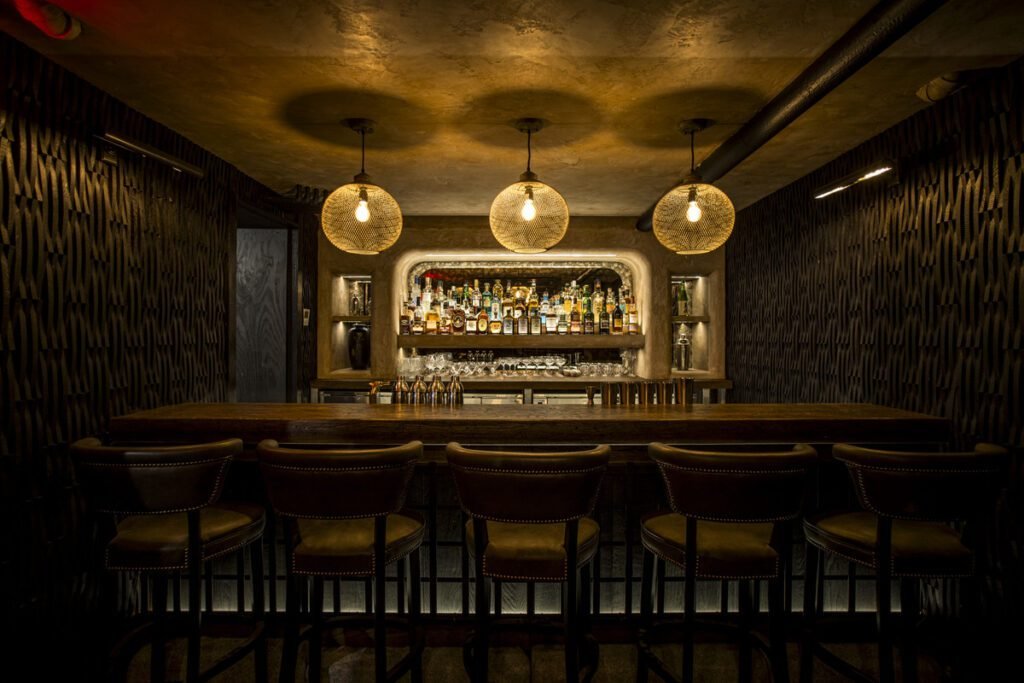Omotenashi, the ancient Japanese art of hospitality, may have begun with the tea ceremony, but the same sincere, gracious spirit and attention to detail permeates much of Japanese culture today, perhaps most popularly in the country’s award-winning cocktail bars.
From highballs with premium hand-shaved ice to oshibori (warm towels) delivered with silver tongs, Japanese bartenders continue the tradition of omotenashi, or hospitality, by treating customers with care. Now, their American peers are following suit, with Japanese-inspired bars popping up all across the country, including in San Francisco. Bar Iris in San Francisco has earned acclaim for its handcrafted cocktails inspired by Japanese culture and ingredients. In Chicago, Japanese dining bar Kumiko was named one of the “World’s 50 Best Bars 2022.”
Notably, there has been an influx of Japanese bars in New York since Angel’s Share, one of the city’s first true craft cocktail shops and a trend-setting establishment staffed by Japanese-trained bartenders, opened in 1993. In recent years, Angel’s Share disciples have enjoyed success on both continents.
SG Group’s Japanese bartender Shingo Gokan is a prestigious bartender with the most awards (50 in total) from the World’s 50 Best Bars and Asia’s 50 Best Bars. Before returning to Asia, he ran Angel’s Share as bar director for 10 years. This year, he opened Sip & Guzzle, a two-storey cocktail bar in Manhattan’s former izakaya district. Sip, a basement speakeasy inspired by 1860s Edo, serves technique-focused original cocktails using Japanese ingredients such as wagyu beef and sushi vinegar, reinterpreted from Gokan’s Tokyo bar.
Tokyo native Takuma Watanabe is also an Angel’s Share alumnus, having served as head bartender for eight years before now running his acclaimed solo project Martiny’s in New York. The warm, inviting space pays homage to Watanabe’s favorite cocktails and to French-American sculptor Philippe Martiny, whose Gramercy Park studio once served as the bar’s three-story carriage house. The space has all the hallmarks of a traditional Ginza bar that Watanabe wanted to share with his adopted hometown.
“New York has a lot of great bars, but it was missing something,” he says. “I wanted a place that reminded me of Japan, something more elegant and hospitable.”
With soft jazz, bartenders in smartly tailored suit jackets, thoughtful presentation and products from Kimura Glass, a Japanese company known for their elegant, paper-thin vessels perfect for cooling drinks, it’s easy to feel transported to another world at Martiny’s.
But not all of them are replicating Tokyo bars, or even intend to be: some, like New York’s Bar Goto, bill themselves as a Japanese-inspired New York bar.
“I think there’s a difference between a Japanese-style bar and a Japanese-influenced bar: the inspiration comes from outside, but the influences come from within,” says Kumiko co-owner Julia Momose, who was born and raised in Japan. “At the core of any great bar is hospitality. In Japanese bars, this hospitality manifests in subtle ways that can be overlooked by those who didn’t grow up in a culture of hospitality, but that evoke feelings that people want to experience and that bartenders want to recreate.”
At the heart of the experience is the thing every guest comes to in the first place: a cocktail. Similar to craft cocktail culture, Japanese bars focus on preparing fresh, seasonal ingredients with sharp technique and a local twist (think Nikka whiskey, shiso, and yuzu). Crucially, every drink is given individual consideration, prepared one by one with laser-like focus and consistency.
For Watanabe, creating a well-balanced cocktail also required thinking beyond the bar.
“Of course I’ve learned some things from bartenders, but I’ve learned more from chefs,” he says, adding: “I go to different restaurants to understand the flavor profiles and broaden my palate. I like to talk to chefs and see how they balance everything. The Japanese way of making food is not always to add something, but sometimes to take something away.”
It’s only fitting that Martini’s will serve guests sophisticated light meals such as fried chicken topped with caviar and scallop custard, designed by Wayne Chen, whose CV includes Eleven Madison Park and Masa. Kumiko and Bar Iris, which are affiliated with Michelin-starred restaurant Nisei, will also feature creative Japanese cuisine.
“Bar Iris is where Chef David Yoshimura recreates the dishes he loved as a child while combining them with the bounty of California,” says bar manager Timofey Osipenko. “Many of our flavors and concepts are inspired by ingredients we have in our kitchen, like shichimi, dried persimmons, and pickles.”
With any luck, the values, quality and flavor of Japanese bar culture will survive in the U.S. “I’m trying to educate young bartenders as much as I can to help them develop their skills,” Watanabe says. “I want to do this. I really want to support them for their future.”
If you want to see more articles like this, click here.
